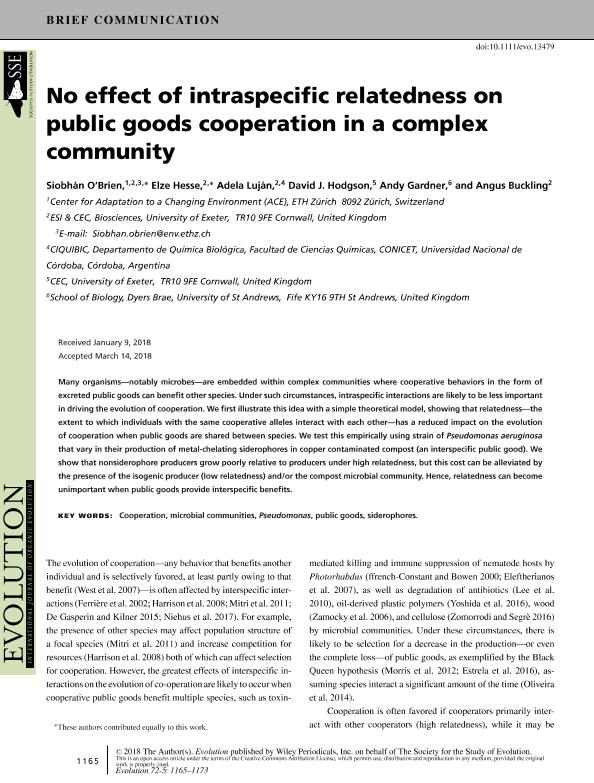Artículo
No effect of intraspecific relatedness on public goods cooperation in a complex community
O'Brien, Siobhán; Hesse, Elze; Lujan, Adela Maria ; Hodgson, David J.; Gardner, Andy; Buckling, Angus
; Hodgson, David J.; Gardner, Andy; Buckling, Angus
 ; Hodgson, David J.; Gardner, Andy; Buckling, Angus
; Hodgson, David J.; Gardner, Andy; Buckling, Angus
Fecha de publicación:
05/2018
Editorial:
Wiley Blackwell Publishing, Inc
Revista:
Evolution
ISSN:
0014-3820
Idioma:
Inglés
Tipo de recurso:
Artículo publicado
Clasificación temática:
Resumen
Many organisms—notably microbes—are embedded within complex communities where cooperative behaviors in the form of excreted public goods can benefit other species. Under such circumstances, intraspecific interactions are likely to be less important in driving the evolution of cooperation. We first illustrate this idea with a simple theoretical model, showing that relatedness—the extent to which individuals with the same cooperative alleles interact with each other—has a reduced impact on the evolution of cooperation when public goods are shared between species. We test this empirically using strain of Pseudomonas aeruginosa that vary in their production of metal-chelating siderophores in copper contaminated compost (an interspecific public good). We show that nonsiderophore producers grow poorly relative to producers under high relatedness, but this cost can be alleviated by the presence of the isogenic producer (low relatedness) and/or the compost microbial community. Hence, relatedness can become unimportant when public goods provide interspecific benefits.
Palabras clave:
COOPERATION
,
MICROBIAL COMMUNITIES
,
PSEUDOMONAS
,
PUBLIC GOODS
,
SIDEROPHORES
Archivos asociados
Licencia
Identificadores
Colecciones
Articulos(CIQUIBIC)
Articulos de CENTRO DE INVEST.EN QCA.BIOL.DE CORDOBA (P)
Articulos de CENTRO DE INVEST.EN QCA.BIOL.DE CORDOBA (P)
Citación
O'Brien, Siobhán; Hesse, Elze; Lujan, Adela Maria; Hodgson, David J.; Gardner, Andy; et al.; No effect of intraspecific relatedness on public goods cooperation in a complex community; Wiley Blackwell Publishing, Inc; Evolution; 72; 5; 5-2018; 1165-1173
Compartir
Altmétricas



